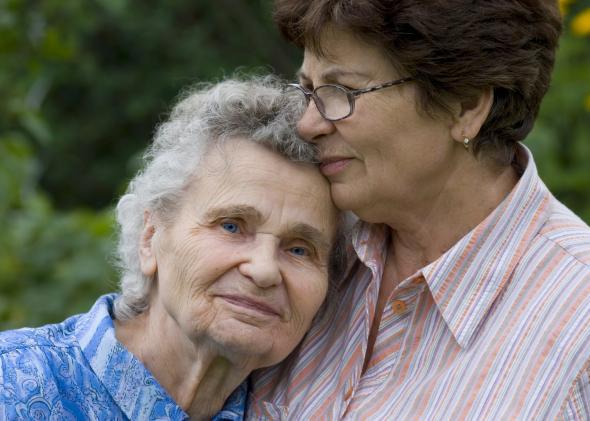The New York Times today takes a look at the work-life balance challenges facing a new generation—the AARP demographic. According to a new study, women aren’t just more likely to make career sacrifices to spend time caring for their kids. They’re more likely to drop out to care for their parents, too.
The study, led by University of Calgary social work professor Dr. Yeonjung Lee, is based on data from the National Institute on Aging’s 2004 Health and Retirement Study, which recorded the activities of more than 5,000 Americans between the ages of 50 and 61. It found that women were much more likely to provide care for elderly parents than men were. Seven percent of the women in the sample “assisted with parents’ personal needs,” compared to 3.6 percent of men; 20 percent of women “helped parents with chores, errands, and transportation,” compared to 16 percent of men. And female caregivers were much more likely to exit the workforce to execute these duties. Women who cared for parents, grandchildren, or more than one relative were significantly less likely to be employed than their peers, but when men took on caregiving roles, their employment status was unaffected.
Why are female caregivers more likely to opt out than their male counterparts? One possibility is that they’re more dedicated caregivers. Since the study included all caregivers who invested at least 100 hours over a two-year period, it lumped in full-time family caregivers with family members who provide more casual help. Caring for a relative’s “personal needs,” like bathing, might constitute a greater investment than running errands (a task where men pick up some of the slack). Another possibility is that older women are more likely to drop out of work, and assume more time-intensive caregiving duties at home, because many of them make less money than their male partners do—a lingering consequence of career sacrifices made earlier in life.
When we talk about women exiting the workforce, we tend to focus squarely on early motherhood. A 2012 study in Demography found that a wage gap emerges when women become mothers because “the accumulation of work interruptions and breaks in schooling” depreciates their value as workers early in their careers, and impedes their ability to secure promotions and raises later on. Mothers may also seek out lower-paying jobs that accommodate part-time hours or flexible schedules to make time for childcare. But as this new study shows, women are also more vulnerable to dropping out a second time, as retirement looms. And while taking leave or reducing hours early in life can have a significant effect on women’s earning potential, dropping out late in life can pose an even greater financial crisis.
New Census numbers released this year show that the poverty gap between men and women gets wider later in life—11 percent of women 65 and older lived in poverty in 2012, compared to 6.6 percent of men. (That’s a 4.4-point gap, versus 3.5 when comparing women and men ages 18-64.) As Dr. Lee told the New York Times, “In the long term, if women leave the labor force, they are at risk … They don’t have enough opportunity to contribute to pensions or save money for the future.”
The debate over women leaving the workforce is often framed in abstract terms—it’s either an issue of “fairness” (men and women should share childcare duties equitably!) or one of “personal choice” (women should be free to do what they want!). But the lived reality behind the debate is this: Bearing the brunt of unpaid care for children and parents compromises women’s financial independence and contributes to poverty in old age. We need to reframe the debate away from the individual choices men and women make in “balancing” their lives, and focus on how our government can ease the childcare and eldercare burdens that put women at risk, and aren’t going away.
The debate over women leaving the workforce is often framed in abstract terms—it’s either an issue of “fairness” (men and women should share childcare duties equitably!) or one of “personal choice” (women should be free to do what they want!). But the lived reality behind the debate is this: Bearing the brunt of unpaid care for children and parents compromises women’s financial independence and contributes to poverty in old age. We need to reframe the debate away from the individual choices men and women make in “balancing” their lives, and focus on how our government can ease the childcare and eldercare burdens that put women at risk, and aren’t going away.
